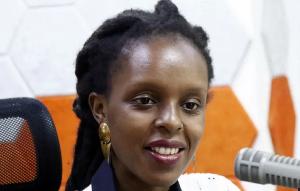Mary Njambi Koikai, better known as Jahmby Koikai, dedicated most of her short life to telling her fellow Kenyans about the debilitating condition of endometriosis, which led to her death this week aged just 38.
As a popular radio host and reggae DJ, she had the perfect platform.
Bravely, she shared her struggles, often calling those in authority to account, demanding better healthcare for women, especially those struggling with menstrual disorders.
“People really identified with her suffering, with her pain,” fellow activist Doris Murimi told the BBC.
From the tender age of 13, she experienced regular monthly torment, an excruciating pain that came with her menstrual cycle.
However, it took 17 years to know exactly what she was suffering from and get a proper diagnosis for the condition.
That was because of the lack of local facilities specializing in the treatment of endometriosis.
Endometriosis is a gynecological condition associated with menstruation where tissue similar to the lining of the womb develops in other areas of the body, including the fallopian tubes, pelvis, bowel, vagina, and intestines.
Endometriosis is not considered fatal, but in rare instances it can cause life-threatening complications.
Symptoms include severe to debilitating pain often in the pelvic area, fatigue, and heavy periods.
In rare cases, it can also appear in other parts of the body including the lungs, brain, and skin.
Ms Koikai’s was one of those extreme cases, with her condition worsening over the years, especially as her reproductive organs matured.
It affected her schooling, relationships, work, and many other aspects of her life.
She recounted to the BBC in 2020 that at one point while in university, she sat an exam but couldn’t write anything because of the pain. She had to repeat some years, delaying her graduation.
In 2015, her lung collapsed from thoracic endometriosis, a rare manifestation of the disease. The condition would recur in subsequent months and years, often requiring specialized surgery.
One of the most enduring images of Ms Koikai is of her in a hospital bed with her upper body heavily bandaged, and many tubes along the right side of the chest.
This was in 2018 when she already had a series of lung collapses and surgeries.
She had been admitted to a specialized hospital in the US and was fundraising for the expensive treatment.
She was weak and in a lot of pain. “I will not describe the pain because I lack words that aptly fit what I’ve been through,” she said at the time.
The condition had ravaged her body. At the US hospital, the tissue that had grown because of the endometriosis was removed from her uterus, bowel areas, and ovaries.
The biggest challenge, she said, was her lungs.
It had spread so much, partly because of the way it had previously been managed back home that the surgeon in the US could not “believe all what had been done”.
“The scar tissue and the placement of wrong chest tubes [in Kenya] created this mess,” she said.
Despite her many scars, she was still smiling.
“Deep scars. Raw scars." As she described it, “each of the scars told a story. I see all I’ve battled. Emotionally. Mentally. Physically.”
Yet she chose to battle her condition with fortitude, while publicly raising awareness of the condition.
Ms Koikai was born in 1986 on the outskirts of the capital, Nairobi.
She was raised by her mother and grandmother, who taught her to be patient and tough in every life situation.
She had always wanted to be a broadcaster from early on.
Despite her condition, she managed to complete her university studies and become a popular radio host and a reggae DJ – also known as Fyah Mummah to her fans.
It’s possible that most people in Kenya got to know of the condition because of her.
LifeStyle of Thursday, 6 June 2024
Source: bbc.com













